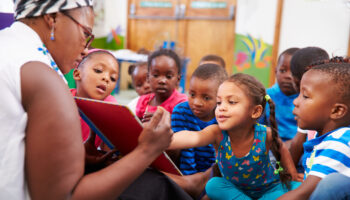Beth Simon
It’s not a matter of opinion. Kids tell THE. WORST. JOKES. Here’s the thing – it’s totally developmentally appropriate. Kids are learning the rhythm of stringing words together and the pattern of asking a question, getting a response, and delivering the punchline. But why are they just so awful at it? Kids tell jokes that aren’t funny and that are basically nonsense because they don’t understand humor yet. Being early childhood educators, we know babies learn language before they ever speak their first word. When you spend time talking with an infant, she might respond to “Do you want some tummy time?” by smiling, cooing, kicking her feet or even making some grunts of her own. It’s the same for older children around preschool or early elementary age that they start hearing parents or older siblings telling jokes. They see that joke-telling can get a reaction and they enjoy trying to make others smile and laugh. Read more
Kids may tell knock-knock jokes, riddles, “Why did the chicken cross the road?” types of jokes, or a “What do you call a…?” jokes. No matter which way you package it, kids just have a talent for making all these unfunny. It really is a talent, isn’t it? Another reason kids are terrible joke tellers is usually because they don’t understand the jokes they’ve been hearing. They see that it makes someone laugh though they don’t “get” the punchline. So, they start experimenting, “Why did the cow go to the doctor? I don’t know. Why? Because he was sick.” “A” for effort, but it’s not quite comedy genius, just yet.
Joke telling is a great way for kids to learn word play and the call and response of a joke. So even the age old, “Knock knock, Who’s there? Boo. Boo who? Don’t cry it’s just a joke!” These types of nonsensical jokes get kids thinking how words can have different meanings, how words can be fun, and how words can be used to amuse others. What happens when a child tells you a joke for the first time? They typically like explaining why it was funny. So, there’s a sort of self-confidence that kids also get from telling the joke and then being able to explain it to you. There’s a sense of approval, acceptance, and a reward that they get by making someone laugh.
Ok, so now we know why – but what do we do about it? Even though we may be weary, we laugh. Even though it might not make sense or really be funny at all. We concede a little bit of our pride to build that child’s confidence. Sometimes we laugh because the joke was just so absurd. If the child is looking for a laugh, a laugh is what we’re going to give him. Ask the child to explain how they came up with their joke. Maybe you offer a suggestion of how they’re joke might be funnier or you could offer “That joke was kind of like the one I tell about the duck who doesn’t like following directions.” Then we get to tell them our own not-so-funny joke, in turn.
Best of luck surviving the unfunny joke phase. It’ll get better… just in time for middle school! If you’re looking at getting some laughs check out some of the hilarious links below. Be sure to mark your calendars for July 1st which is International Joke Day or August 16th which is National Tell a Joke Day! And if you’re dying to know about that duck who doesn’t like following directions…he prefers to wing it!
We’d love to hear from you! Share some of your favorite kid-friendly or child-created jokes in the comments.
Knock Knock. Who’s There? Kids. Kids Who? Kids Tell Terrible Jokes.
Socially Acceptable: Teaching Kids to Tell Jokes
101 Knock Knock Jokes for Kids and Adults that are so Bad They’re Good




